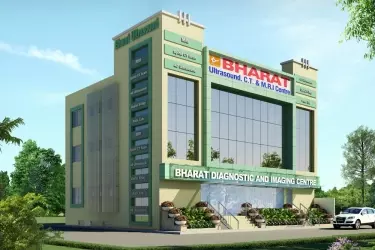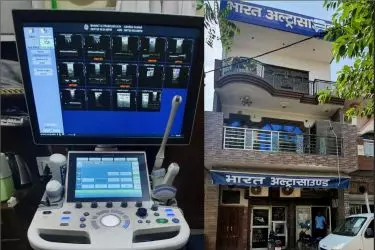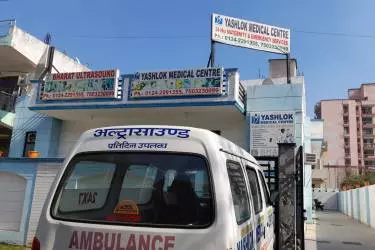
The Spine is made of Bones called Vertebrae and soft cushion between these vertebrae called the disc. The spine is surrounded by muscles and nerves. The spine can be divied into 3 parts - Cervical, Thoracic and Lumbar. Most of the adults would have 24 Vertebrae - 7 in the Cervical Spine, 12 in the Thoracic Spine and 5 in the Lumbar Spine. This makes Thoracic Spine the biggest of them all. The thoracic spine supports the rib cage and protects vital organs like heart and lung.
The Thoracic Spine does not move much when you bend or twist and is therefore less prone to problems like pain as compared to the Cervical Spine and the Lumbar Spine. Office workers are prone to having pain in the neck region which can spread to the shoulders and radiate into the arms. Similarly poor posture while working on a desk can result in low back pain which can spread into the hips and can radiate into the legs.
MRI is the gold standard for diagnosing the spinal problems. If the pain is in the neck region then MRI Cervical Spine is done. If pain is in the mid back region then MRI Dorso-Lumbar Spine is normally done. If pain is in the lower back then MRI Lumbo-Sacral Spine is preferred. Somethimes when the pain is in the entire back then MRI Screening of the Whole Spine is also done on the advice of your doctor.
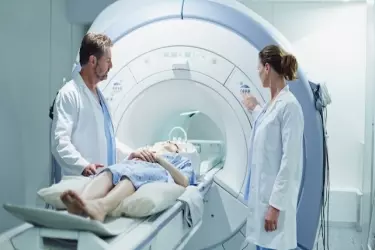
Most of the MR Studies for the spinal region are non-contrast studies and can be done at any time of the day with prior appointment. However if the doctor is suspecting cancer then contrast imaging might be required. During the MRI exam, you would be in a room which has strong magnetic field. You should not be wearing any jewellery and should inform the technician if you have any kind of implant inside your body. In any case our technician would be checking you with a metal detector before taking you inside the magnet room. The study would take around 15-30 minutes to complete for each level of spine. If MRI Screening of the Whole Spine is required then it would take around 20 minutes.
You are advised to leave your mobile phone, wallet and all clothes inside a locker which is provided to you. You would be given a hospital gown to wear for the test. There is a humming sound which resembles the sound of a running train while the exam is going on. You would be given ear plugs to minimize this sound. You would be required to go inside a cylinderical tunnel and lie still while the exam is going on. On completion of the test, you can change into your own clothes and leave for your home. The MRI Spine exam will produce several hundred images which will be reviewed by the radiologist and the report would be made available within 24 hours of the scanning.
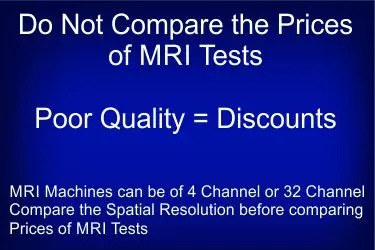
MRI Machines are of two types - Permanent Magnet and Superconducting Magnet. The Permanent Magnet MRI or Open MRI as it is called comes in two strengths - 0.2 Tesla and 0.3 Tesla. The Superconducting Magnet comes in strengths of 1.5 Tesla and 3.0 Tesla. Tesla is the unit for magnetic strength. The common belief is that higher the Tesla, better is the imaging quality but this is not the case. Higher magnetic strength can produce greater noise and result in lower signal to noise ratio. MRI of the Brain, Joints and Spine can be done equally well on a 0.3 Tesla Permanent Magnet as it is done on a 1.5 Tesla Magnet. However inner ear imaging is best done on a 3 Tesla MRI. Many doctors would prescribe MRI scan on a 3 Tesla Machine without knowing the difference in imaging quality. The quality of imaging also depends on the quality of coils, channels in the machine and specialized applications for doing the scanning. Finally the quality of reporting is of paramount importance in any MRI Imaging. At Bharat Diagnostics we have the optimum combination of all these factors. We have all types of machines at different centres. So patients who are claustrophobic, are advised to get their MRI on open magnet of 0.3 Tesla. Patients who require extensive testing like MRI brain and whole spine would do better to go for 3 Tesla as the imaging time is lesser.
The cost of MRI Spine for each level - Cervical, Dorsal or Lumbar at our centres is in the range of Rs. 7000 - 7500. If contrast is needed then additional amount of Rs. 3500 - 3700 is charged for the test. MRI Screening for each level would cost Rs. 2500 - 3700. MRI Screening for the whole spine can be done in the range of Rs. 7500 - 8500.
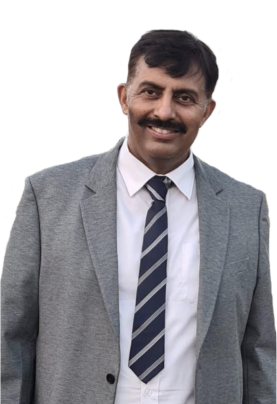
Dr Rajesh Choudhary has more than 20 years of experience in the field of Radiology. Dr Choudhary has been trained in the latest radiological techniques from Sardar Patel Medical College, Bikaner and PGI Chandigarh.
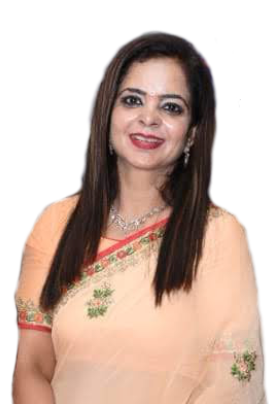
Dr Shruti Sangwan has been trained at Lady Hardinge Medical College, Maulana Azad Medical College, PGI Chandigarh and Artemis Hospital Bhiwadi in the field of Radiology and has more than 18 years of experience.
